
European Journal of Psychology Applied to Legal Context
Scope & Guideline
Fostering Collaboration Between Psychology and Legal Experts
Introduction
Aims and Scopes
- Psychological Assessments in Legal Settings:
Research exploring the methodologies for psychological evaluation in legal contexts, including assessments of witnesses, defendants, and victims. - Interventions for Vulnerable Populations:
Studies focusing on psychoeducational and therapeutic interventions aimed at vulnerable groups, such as children and victims of violence. - Risk Assessment and Management:
Investigations into evaluating and managing risks associated with criminal behavior, including recidivism and violence. - Cognitive Techniques for Information Gathering:
Research on cognitive interviewing techniques and other methods aimed at improving the accuracy of information recall from witnesses. - Impact of Social and Psychological Factors on Legal Outcomes:
Examinations of how psychological, social, and cultural factors influence legal processes and outcomes, including issues of consent and victimization.
Trending and Emerging
- Gender-based Violence and Consent:
There is a notable increase in research addressing issues of gender-based violence, consent, and the psychological experiences of victims, highlighting a societal shift towards understanding these critical topics. - Cybervictimization and Mental Health:
Emerging studies focus on the psychological impact of cybervictimization, particularly among adolescents, reflecting the growing relevance of digital contexts in psychological research. - Neuropsychological Factors in Offender Behavior:
Research is increasingly exploring neuropsychological aspects influencing criminal behavior and recidivism, indicating a trend towards integrating biological perspectives in psychological assessments. - Innovative Interview Techniques for Truth Detection:
There is a rising focus on developing and validating innovative techniques for detecting deception and improving witness recall, showcasing advances in cognitive psychology applied to legal contexts. - Multicultural and Cross-national Studies:
The journal is increasingly publishing studies that consider multicultural and cross-national perspectives in legal psychology, reflecting the globalization of legal and psychological issues.
Declining or Waning
- Traditional Forensic Psychology Topics:
There appears to be a decrease in traditional themes such as basic forensic evaluations and assessments, as the focus shifts towards more applied and intervention-oriented research. - Generalized Studies on Violence:
Research on generalized violence without specific contexts or populations is becoming less common, with a movement towards more nuanced and context-specific inquiries. - Static Models of Risk Assessment:
The reliance on static models for assessing risk in criminal behavior is declining, as newer dynamic and comprehensive approaches take precedence.
Similar Journals

Pratiques Psychologiques
Fostering Dialogue in the Heart of PsychologyPratiques Psychologiques is an esteemed academic journal published by Elsevier France - Éditions Scientifiques Médicales Elsevier, dedicated to the multifaceted field of psychology. Since its inception in 2004, this periodical has been pivotal in disseminating research and insights that traverse various aspects of psychological practice and theory, serving as a platform for professionals and academics alike. With an impact factor indicative of its robust standing in the discipline—being placed in the Q4 category of Psychology (miscellaneous) and ranked at the 28th percentile within its field—Pratiques Psychologiques continues to play a significant role in advancing understanding and engagement among psychologists. Although it does not currently operate under an Open Access model, the journal still provides valuable content crucial for researchers, students, and practitioners aiming to stay at the forefront of psychological studies. Its address in France further signifies its commitment to fostering a broader European dialogue within the psychological community.
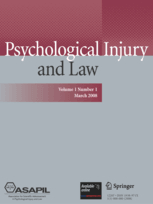
Psychological Injury & Law
Transforming Legal Perspectives on Psychological HealthPsychological Injury & Law, published by SPRINGER, stands at the forefront of interdisciplinary research, merging insights from the fields of law, psychology, and mental health. With an ISSN of 1938-971X and an E-ISSN of 1938-9728, this esteemed journal aims to address the complexities of psychological injuries within legal contexts, providing a platform for scholars to explore the intersection of legal principles and psychological well-being. Recognized for its rigor, it has achieved a Q1 ranking in both Ecology and Law, and a Q2 ranking in Psychiatry and Mental Health for 2023, demonstrating its influence and contribution to these fields. Additionally, with impressive Scopus ranks placing it in the 95th percentile within Social Sciences (Law) and the 70th percentile in Medicine (Psychiatry and Mental Health), the journal consistently showcases high-quality, impactful research that resonates with professionals, academics, and students alike. By fostering a deeper understanding of psychological injuries, it serves as an essential resource for those seeking to navigate the intricate relationships between mental wellness and legal frameworks.

Pensando Psicologia
Empowering Minds Through Accessible ResearchPensando Psicologia is an esteemed open-access journal publishing cutting-edge research in the field of psychology since its inception in 2010. Produced by UNIV COOPERATIVE COLOMBIA, this journal serves as a vital platform for scholars, practitioners, and students to disseminate and explore innovative findings and theories that advance psychological science. With an ISSN of 1900-3099 and an E-ISSN of 2382-3984, it emphasizes accessibility and inclusivity in research, making its content freely available to a global audience. Based in the vibrant city of Medellín, Antioquia, Colombia, Pensando Psicologia focuses on diverse areas within psychology, including clinical, educational, social, and developmental perspectives, thereby promoting interdisciplinary dialogue and collaboration. As the field of psychology continuously evolves, this journal remains a vital resource, providing essential insights that contribute to both academic scholarship and practical applications in mental health and well-being.
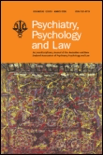
Psychiatry Psychology and Law
Bridging Mental Health and Legal LandscapesPsychiatry Psychology and Law is a prestigious journal dedicated to advancing the understanding of the interconnections among mental health, psychological conditions, and legal contexts. Published by Routledge Journals, Taylor & Francis Ltd, this journal plays a pivotal role in the field, evidenced by its impressive Q1 ranking in Law and notable positions in multiple disciplines such as Psychiatry and Forensic Medicine. With a commitment to disseminating high-quality research, it has established itself as an essential resource for researchers, professionals, and students in psychology and legal studies. While currently not offering Open Access options, the journal thrives on rigorous peer review processes that ensure only the most impactful studies from its inception in 1994 to the present are published. Covering a diverse range of topics, Psychiatry Psychology and Law fosters interdisciplinary dialogue and innovation, making it a vital platform for advancing scholarly discourse in the critical intersection of mental health and law.

Journal of Forensic Practice
Exploring Innovations in Forensic Science and PracticeThe Journal of Forensic Practice, published by Emerald Group Publishing Ltd, is a leading scholarly resource dedicated to the interdisciplinary domain of forensic science, law, and psychology. With an ISSN of 2050-8794 and an E-ISSN of 2050-8808, this journal serves as an essential platform for disseminating cutting-edge research and innovative practices in the field, spanning from 2013 to 2024. Despite its current impact factor positioning, ranking in quartiles such as Q4 in Applied Psychology and Q2 in Law illustrates its relevance to diverse academic communities, particularly within the United Kingdom and beyond. Researchers, practitioners, and students benefit from the journal's commitment to enhancing the understanding of the intersection between legal frameworks and psychological principles, thereby fostering a more robust forensic practice. The journal is not currently an open-access publication, ensuring a focused and specialized audience while gradually building its reputation across various Scopus categories. As the field of forensic practice evolves, this journal remains a vital source of knowledge, offering insight and guidance to the contemporary challenges faced by professionals in law and forensic sciences.
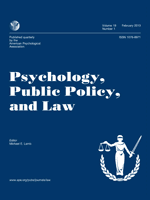
PSYCHOLOGY PUBLIC POLICY AND LAW
Exploring the Nexus of Mind, Law, and Society.Psychology, Public Policy, and Law is an esteemed peer-reviewed journal published by the American Psychological Association (APA), focusing on the intersection of psychology and law. With a rich history dating back to 1995, the journal has solidified its importance in shaping legal practices and public policy through empirical research and theoretical analysis. It enjoys a prestigious ranking, notably within the Q1 category in both Law and Sociology & Political Science for 2023, reflecting its impactful contributions to these fields. Although access is not open, the journal is essential for researchers, practitioners, and students who seek to understand the psychological dimensions influencing legal decisions and policies. The journal's robust publication includes studies that provide insights on critical issues affecting society, making it a vital resource for advancing knowledge and informing policy at local, national, and international levels. With an ISSN of 1076-8971 and an e-ISSN of 1939-1528, it stands as a leading outlet for innovative research that bridges the gap between psychology, law, and public policy.

LAW AND HUMAN BEHAVIOR
Pioneering Research on Law's Impact on Human BehaviorLAW AND HUMAN BEHAVIOR, published by the Educational Publishing Foundation of the American Psychological Association, is a leading interdisciplinary journal that explores the intersection of law and psychology. Established in 1977, this prestigious journal has garnered a reputation for its rigorous scholarly contributions, evidenced by its impressive impact factor and high rankings in various quartiles, including Q1 in both Arts and Humanities and Law in 2023. With its comprehensive scope encompassing critical issues in legal psychology, jury behavior, and the psychological underpinnings of legal decision-making, the journal serves as a vital resource for researchers, professionals, and students alike. Although not an open-access publication, it provides invaluable insights relevant to practitioners and academics focusing on the nuances of human behavior within legal contexts. With ongoing commitment to advancing research through its convergence of psychological and legal discourse, LAW AND HUMAN BEHAVIOR is indispensable for those aiming to bridge the gap between these crucial fields.
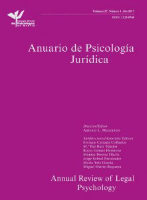
Anuario De Psicologia Juridica
Bridging Minds and Justice.Anuario De Psicologia Juridica is a prestigious academic journal published by the COLEGIO OFICIAL PSICOLOGOS MADRID, specializing in the intersection of psychology and law. Since becoming an Open Access publication in 2013, the journal has made significant strides in expanding access to high-quality research, thereby fostering knowledge dissemination and engagement in the fields of Applied Psychology, Law, and Forensic Medicine. With a notable impact factor and categorized as Q3 in Applied Psychology, Q1 in Law, and Q2 in Pathology and Forensic Medicine, it stands out for its contributions to the evolving nature of forensic psychology and legal assessment. As of 2023, the journal is ranked in the 90th percentile among law journals and in the 58th percentile among pathology and forensic medicine, underscoring its relevance and authority. Researchers, professionals, and students will find Anuario De Psicologia Juridica to be an invaluable resource for cutting-edge research and practical applications that aim to bridge psychological theories with legal practices.
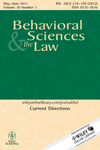
BEHAVIORAL SCIENCES & THE LAW
Unraveling the Complex Ties Between Behavior and LawBehavioral Sciences & The Law is a premier interdisciplinary journal published by Wiley, dedicated to exploring the intricate relationships between behavioral sciences and legal systems. Established in 1983 and continuing through 2024, this journal provides a vital platform for researchers, professionals, and students in the fields of law, clinical psychology, medicine, and psychiatry. With an impressive impact factor reflected in its Q1 ranking in Law and Q3 in Clinical Psychology, Psychiatry, and Medicine, it stands out in the academic community, facilitating scholarly discourse and advancing understanding in these critical areas. While currently not following an open access model, the journal’s reach is extensive, delivering cutting-edge research and thought leadership from the United Kingdom to a global audience. Whether you are investigating the psychological dimensions of legal practice or the implications of law on behavioral health, Behavioral Sciences & The Law remains an essential resource for those committed to the intersection of these disciplines.

Eureka-Revista Cientifica de Psicologia
Empowering Scholars to Share Insights that Matter.Eureka-Revista Cientifica de Psicologia is an esteemed academic journal dedicated to advancing the field of psychology through rigorous research and insightful contributions. Published by CDID-CENTRO DOCUMENTACION, INVESTIGACION & DIFUSION in Asuncion, Paraguay, this journal serves as a crucial platform for scholars, practitioners, and students to disseminate their findings and enrich the scientific discourse of psychology. While it operates under an open-access model, facilitating widespread access to academic knowledge, the journal is committed to publishing high-quality articles that cover various sub-disciplines within psychology, including cognitive, developmental, social, and clinical psychology. By providing a space for interdisciplinary collaboration and fostering innovative research, Eureka significantly contributes to the understanding of psychological phenomena and the application of science in real-world settings. Researchers and professionals alike can benefit from the latest insights shared within its pages, making it an invaluable resource in the psychological community.